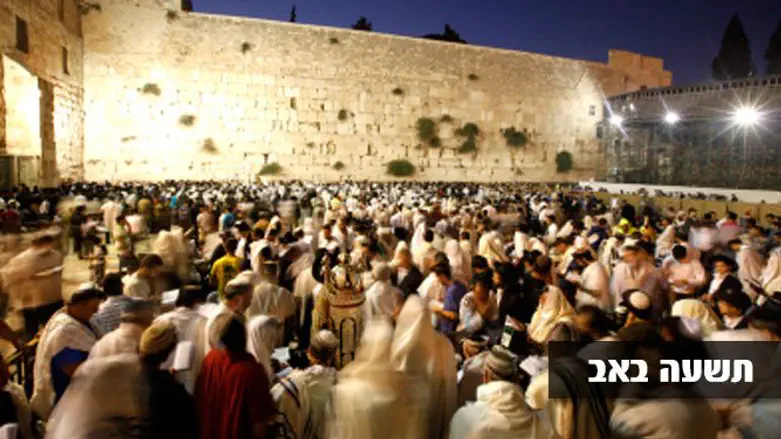
It also marks the destruction of the two Holy Temples in Jerusalem. After the Second Temple was destroyed, no Jewish government existed in Israel until 1948, when the modern State of Israel was founded.
Newspapers report that thousands, even tens of thousands stand before the Kotel on Tisha B'av. The Jewish People Policy Institute's (JPPI) Israeli-Judaism research project found that the number of Israeli Jews who say they visit the Western Wall on Tisha B'av is more than two hundred thousand. Assuming that some respondents were less than forthcoming and that not all of them show up every year, the fact that they state their willingness to show up has meaning and shows they feel it is necessary to visit the Kotel on Tisha B'av .
Who are these two hundred thousand people? Four percent of Israeli Jews say that they visit the Western Wall on Tisha B'av, almost two hundred and fifty thousand Jews. The research shows that they are religious or haredi.
According to the survey, which was conducted by Professor Camil Fuchs, a little more than thirty percent of Israelis (31 percent) define themselves as liberal–religious, religious, haredi Zionist, or haredi. About 9 percent of religious and haredi and Jews and three percent of traditional Jews say they visit the Western Wall on Tisha B'av. The percentage of secular Jews who visit the Western Wall on Tisha B'av is nearly zero.
Approximately a third of Jewish Israelis fast on Tisha B’av. Like any other fast, some Jews (36 percent) fast for the entire day, some (6 percent) fast only part of the day, and some (2 percent) avoid food but drink fluids.
Fewer Israeli Jews fast on Tisha B’Av than on Yom Kippur (the Day of Atonement). The study shows that Tisha B'av is a more sectorial fast, unlike Yom Kippur when many traditional and secular Jews partake. For example, 91 percent of traditional Israelis fully fast on Yom Kippur while only 27 percent of them do the same on Tisha B'av.
This difference is nonexistent in the haredi sector, where 97 percent fast on Tisha B'av and 99 percent fast on Yom Kippur.
A larger number of Jews observe the longer 25-hour fasts, Yom Kippur and Tisha B'Av, than the shorter "minor" fasts. Thirty-one percent of Jews observe the religious tradition of not wearing leather on Tisha B'av and most of those who observe the fast also wear canvas shoes.
However, fifty-five percent of Israeli Jews claim that as far as they are concerned, Tisha B'Av is just a regular day. For other national days of mourning like Holocaust Remembrance Day or the Memorial Day Fallen Soldiers and Victims of Terror, only a small percentage of Jews (9 and 5 percent respectively, most of them haredi) claim they are just regular days.
JPPI's analysis was drawn from a survey conducted of 3000 Israeli Jews in two rounds, one of 2000 respondents and another of an additional 1000 respondents, a representative sample of the Jewish public in Israel. The statistical margin of error for the sample of 3000 is 1.8 percent.